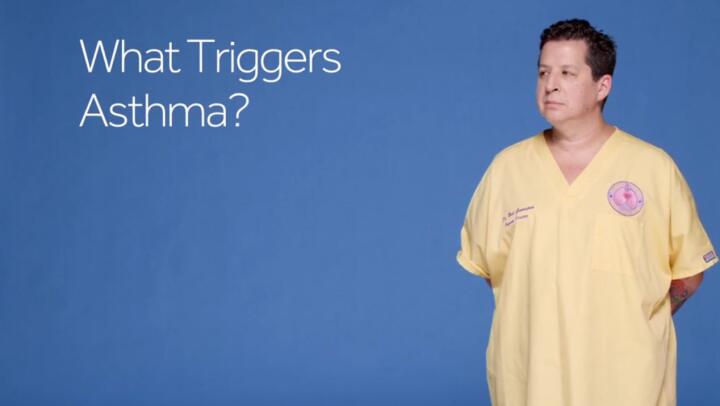
Of the 25 to 30 million people living in the United States with asthma, about 5 to 10% of them have a severe form of the condition.
Allergy and immunology specialist Jim Haltom, MD, discusses what patients need to know about this rare but serious form of asthma.
A: Asthma is a chronic lung disease in which a patient’s airways become inflamed in response to certain triggers, causing him or her to experience a spectrum of symptoms, from chest tightness to shortness of breath to difficulty performing physical activity. Asthma cases are loosely categorized as mild intermittent, mild persistent, moderate persistent, and severe persistent. The severity of the illness is based on how frequent and significant your symptoms are. Patients with severe asthma experience symptoms throughout the day, often have symptoms like shortness of breath and coughing at night, and may need to use a rescue inhaler up to several times a day. As a result, their lungs operate at less than 60% of normal capacity and their activity levels are seriously limited. Any one of these symptoms can put you in the severe category. But no matter how severe your asthma is, our emphasis as physicians is on finding a way to control the problem by tailoring the treatment options to our patients’ needs.
A: We don’t know what causes a patient to develop severe asthma, but we do know the triggers that make cases worse. These triggers are the same for all forms of asthma and they include sinus disease, viral upper respiratory infections, exposure to allergens, exercise, and acid reflux disease. Emotional stress, weather changes, and even strong odors, like cigarette smoke and perfumes, can provoke asthma attacks. Viral respiratory illnesses and allergic reactions are two of the most common triggers that can lead to an episode of asthma. We also know that asthma patients who are obese are more likely to experience severe symptoms than patients with a normal weight.
A: The first line of therapy for severe asthma is medium to high doses of inhaled corticosteroids. Given through an inhaler device, these anti-inflammatory drugs help reduce swelling and mucus production in your body’s airways, making intense reactions to triggers less likely. In this first line of treatment, I would also prescribe a long-acting bronchodilator for asthma (LABA). This inhaled medicine is intended to provide long-term control over symptoms, rather than quick relief. Leukotriene modifier drugs are another line of treatment given orally in severe asthma cases, often for allergy-related asthma. In the worst cases, I might also prescribe a course of oral steroids. Oral steroids have a lot of potential side effects, such as weight gain, high blood pressure, cataracts, elevated blood sugar, and bone thinning, so I usually only recommend these drugs for short-term relief in flare-up situations.
In the last few years, new treatment options have emerged to help the patients whose asthma is extremely difficult to control. Several biologic agents—cutting-edge drugs developed using biotechnology that use your body’s own immune system to target disease—are now used to treat severe asthma. Given as an injection or through intravenous administration, biologics are highly effective. Omalizumab (Xolair) was the first drug in this class approved for treatment in adults and children with severe asthma. Biologics are also being used to reduce the number of eosinophils in the blood. Eosinophils are a type of white blood cell that, when produced in excess, can cause inflammation in the lungs, often leading to severe cases of asthma. The new drugs to treat severe eosinophilic asthma include mepolizumab (Nucala) and reslizumab (Cinqair). If you can’t get your asthma under control, talk to your doctor about biologics.
For patients that can’t manage their severe asthma using all other treatment options, I might discuss a procedure called bronchial thermoplasty. A minimally invasive procedure, this surgery uses a bronchoscope tube to deliver high-frequency radio waves that heat up the lung’s lining and destroy the smooth muscle. In an asthma attack, this smooth muscle in the lung tightens abnormally, making it difficult to breathe.
A: It is highly unlikely that a patient with severe asthma would ever “grow out” of the disease or see it improve without taking medicine. But with new treatment methods and a plan to understand your body’s reaction to certain triggers, patients can expect to get even the worst cases under control. It is also important to note that, because asthma is a chronic disease and its severity often depends on external triggers, you could be living with a mild form of asthma and experience a severe reaction to a trigger. That’s why it is important to talk with your doctor about how to respond to different scenarios.





















